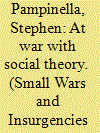| Srl | Item |
| 1 |
ID:
142605


|
|
|
|
|
| Summary/Abstract |
As US counterinsurgency campaigns draw to a close, doctrine for asymmetric warfare written during the War on Terror has come under heavy criticism. While many have argued that this shift to ‘winning hearts and minds’ is evidence that the United States is taking humanitarianism and nation-building seriously, others argue that a wide gap exists between US counterinsurgency doctrine and the protection of civilians afflicted by conflict. In this article, I show that the latter is true by comparing theories of instrumental and communicative action to US doctrine for operational design, stability operations, and counterinsurgency. I argue that these texts treat the people as an object to be manipulated for the achievement of pre-determined self-interested strategic goals rather than members of a community that jointly designs operations to fulfill shared objectives. However, US doctrine does contain communicative elements that, if prioritized, would better support humanitarian and state-building objectives otherwise subordinated in the War on Terror.
|
|
|
|
|
|
|
|
|
|
|
|
|
|
|
|
| 2 |
ID:
161632


|
|
|
|
|
| Summary/Abstract |
This article reads Alexander Wendt’s Quantum Mind and Social Science as a work of social theory. A crucial element of any social theory is its account of action or agency. I explore Wendt’s quantum theory of social action by analysing two issues. First, Wendt argues that the success of quantum decision theory implies that human behaviour is quantum and therefore is likely to have been produced by a quantum brain. I interrogate this assumption and argue that it rests on the claim that mathematical descriptions map human and social reality in a realistic way. Second, Wendt combines quantum measurement, quantum linguistics, and quantum decision theory into a contextual account of human agency. On this image, social action arises out of connections to interwoven phenomenological, social, and temporal contexts. I suggest that this account of agency is appealing in some ways, but that social theorists have been working on a similar image outside the physics constraint for some time. I conclude that while insights from quantum social science should be an essential component of any post-classical social theory, the task of theorising social agency should not take place exclusively under the constraints of quantum physics or other mathematical descriptions.
|
|
|
|
|
|
|
|
|
|
|
|
|
|
|
|